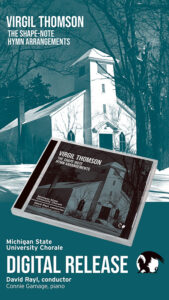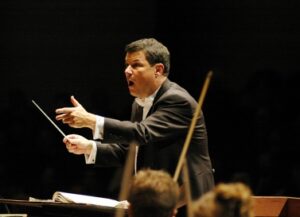
Available now via streaming services, Virgil Thomson: The Shape-Note Hymn Arrangements explores the notation style that offers a unique look into American culture.
In the nineteenth century, American songbooks known as “shape-note hymnals” used notes in different shapes to aid singers and teach singing. Now, a new release by David Rayl and the University Chorale of Michigan State University offers a unique opportunity to listen to arrangements of this type of choral work by composer Virgil Thomson.
Available now via streaming services, Virgil Thomson: The Shape-Note Hymn Arrangements explores the notation style that offers a unique look into American culture. Rayl, senior associate dean for graduate studies and research and the director of choral programs in the MSU College of Music, spearheaded the project in cooperation with the Budds Center for American Music Studies at the University of Missouri.
The following paragraphs are adapted from Rayl’s essay “Songs of ‘Little Dixie’: The Shape-Note Hymn Arrangements of Virgil Thomson,” which will appear in Legacies of Power in American Music: Essays in Honor of Michael J. Budds (Taylor & Francis/Routledge).
“Although eclipsed by that of Aaron Copland, Virgil Thomson’s music was described by Copland himself as ‘a lesson in how to treat Americana’ and ‘evocative of the homely virtues of rural America.’ This recording offers Thomson’s two most ‘American’ choral works—Hymns of the Old South (1949) and Southern Hymns (1984)—each consisting of four settings of hymns from the shape-note singing tradition of the antebellum South. One verse of its shape-note model precedes each arrangement. Southern Hymns appear for the first time on a commercially released recording.

David Rayl, senior associate dean for graduate studies and research and the director of choral programs, spearheaded the Virgil Thomson project in cooperation with the Budds Center for American Music Studies at the University of Missouri.
“Only a few decades ago critics and music historians placed Virgil Thomson near the pinnacle of American composers, and hailed him as one of the first to write truly American music. He composed dozens of choral works for choirs of all types and many of those works were published and continue to be available, but today, even the most erudite conductors know few of them.
“Contrary to the assertions of other scholars, Thomson did not grow up singing these shape-note hymns, although his Baptist forebearers certainly sang them. Nevertheless, this repertoire stood at the center of his determination to forge a new American musical identity.”
The University Chorale performed some of these arrangements in the fall of 2018, prior to the recording session. This release is the first time they have appeared on record.
“I’m thrilled that the combined resources of the MSU College of Music and the School of Music at the University of Missouri have made possible these imaginative, accessible, and attractive works by a major American composer,” Rayl said. “They deserve the attention of twenty-first-century American conductors.”



